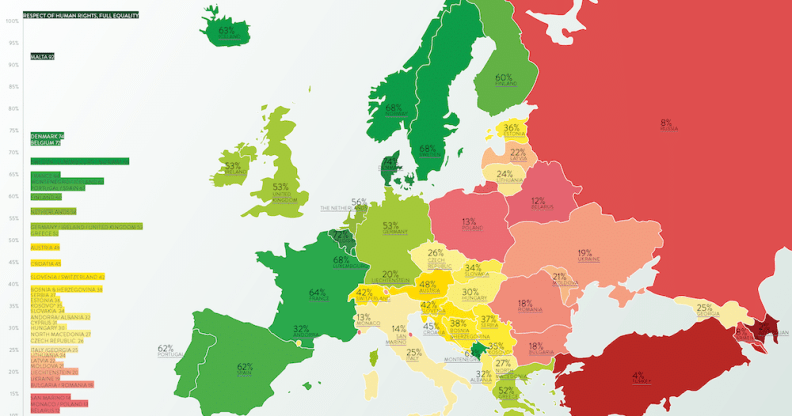UK plummets further down ranking of LGBTQ-friendly countries in Europe

ILGA Europe’s 2022 Rainbow Map and Index. (ILGA Europe)
The annual Rainbow Map ranking has placed Malta as the best nation for LGBTQ+ rights in Europe for the seventh year in a row, while the UK’s score continues to plummet.
ILGA Europe’s Rainbow Map and Index has ranked European countries on the basis of their “legal and policy situation” for LGBTQ+ people each year since 2009. It ranks countries from zero to 100 per cent, with zero per cent representing gross violations of human rights and discrimination, and 100 per cent representing respect of human rights and full equality.
Countries are scored on seven categories; equality and non-discrimination, family, hate crime and hate speech, legal gender recognition, intersex bodily integrity, civil society space and asylum.
The 2022 list placed Malta at the top for the seventh time, with a score of 92 per cent. The country was followed by Denmark with 74 per cent and Belgium with 72 per cent.
ILGA Europe noted: “Denmark has jumped seven places to achieve second spot in the 2022 ranking.
“The reason for Denmark’s jump is that it is taking the lead in filling in anti-discrimination gaps in current legislation, including the equal treatment law, which covers health, education, employment, provision of goods and services, and the penal code to include sexual orientation, gender identity, gender expression and sex characteristics (SOGIESC) as aggravating factors in hate crime.”
Until 2015, the UK consistently achieved the number one place in the Rainbow Map and Index ranking, but since then has slipped down the list.
It placed ninth in 2020, 10th in 2021, and this year plummeted to 14th place.
“The United Kingdom has suffered a significant drop in ranking, going from 10th to 14th place,” said ILGA Europe.
It said the drop was in part because of recent revelations about the Equality and Human Rights Commission (EHRC), the UK’s equalities watchdog, which is “not, as set out in its mandate, effectively protecting on the grounds of sexual orientation and gender identity”.
The organisation added: “This comes at a time of widespread political and media anti-trans sentiment, while the British government is not moving on long-promised reforms on gender recognition and banning so-called ‘conversion therapy’ for all.”
The worst countries for LGBTQ+ people were Azerbaijan, with just two per cent, Turkey with four per cent, and Armenia with eight per cent. The three countries have retained the bottom three places for the past two years.
Although some countries had made great strides when it came to LGBTQ+ equality, the overall picture in Europe was lacking.
“There remain significant gaps in terms of fundamental protection against discrimination and violence in nearly half of the countries,” said ILGA Europe.
“Currently, 20 countries out of 49 still have no protection against hate crime based on sexual orientation, while 28 countries have no protection against violence based on gender identity.”
ILGA-Europe’s advocacy director Katrin Hugendubel said: “Despite the new dynamic we’re clearly seeing, the situation remains fragile. A downward spiral of hostile political discourse, legislative stagnation and, in some countries, even withdrawal of LGBTI rights and freedoms is worrying.
“And while countries like Bulgaria and Romania, for example, have not been in the headlines, they are moving down in ranking, nearer and nearer to Poland, which is at the very bottom in the European Union.
“The situation in the UK is a sad reminder that when governments don’t stand strong on their commitments to advance minority rights, a powerful opposition can use that space to spread hate and division.”

